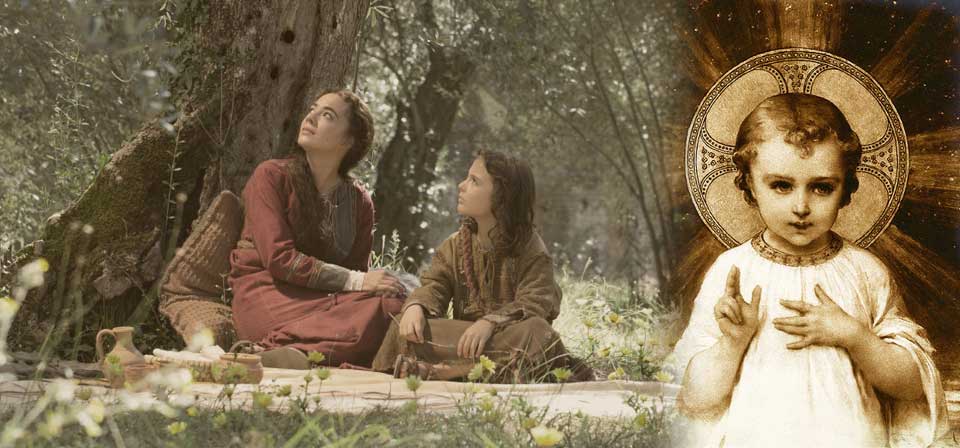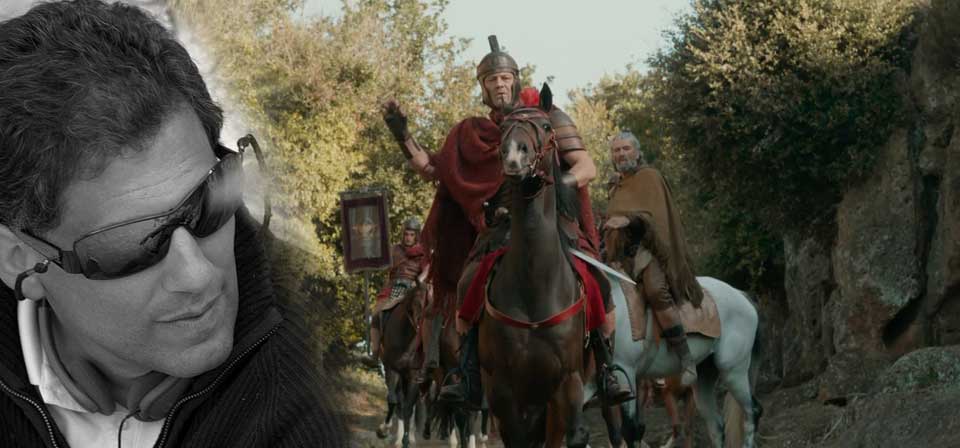The Young Messiah (2016)
My middle daughter laments that while the New Testament records the names of four of Jesus’ brethren, his sisters are mentioned but never named (Mark 6:4). The Young Messiah rectifies this from the opening scene, depicting 7-year-old Jesus playing with a sister-cousin named Salome.
Caveat Spectator
Scenes of deadly violence, including the slaughter of the innocents and crucifixion; scenes of scary menace, including a demonic figure. Might be too much for sensitive kids.To many, the name Salome conjures the sordid story of Herod and Herodias, the dance of the seven veils, and the beheading of John the Baptist. From my first round of seminary studies more than 20 years ago, I recall that Salome is the second most common female name in the Second Temple-era Jewish world (nearly half of all recorded female Hebrew names at this time were variants of Mary or Salome). It seems someone has done her homework.
The someone is Anne Rice, who wrote Christ the Lord: Out of Egypt on her return to the Catholic faith of her youth in 1998, though she has since become alienated from the Church again. Rice’s book has considerable strengths and notable weaknesses, but its key asset is something missing in so many contemporary retellings of biblical stories: a fresh perspective, a sense of curiosity and discovery as well as reverence and genuine theological wonder.
The Young Messiah, smartly adapted by director Cyrus Nowrasteh and his wife and writing partner Betsy (The Stoning of Soraya M), maximizes many of the book’s strengths while reining in dubious elements. The divine first-person narration, Rice’s boldest and perhaps most questionable choice, is gone, except for a brief voiceover at the denouement. On the other hand, one of the book’s most striking passages, an encounter between the boy Jesus and the Adversary, has been shrewdly expanded and reworked throughout the story.
The outcome of Rice’s curiosity and daring and the Nowrastehs’ moderating influence is a rare Bible movie I can imagine watching with a mixed group of believers and nonbelievers and finding that it sustains everyone’s interest.
Most contemporary Bible movies tend either to appeal largely to the devout (Risen; Son of God) or else to alienate many of that same constituency (Exodus: Gods and Kings). Films of the first sort are often seen as rehashing familiar Bible stories; those of the second sort are often seen as making a hash of them.
The Young Messiah does neither. Instead, it goes its own way, charting a period in the life of Jesus about which the New Testament gives us essentially no information, beginning with the Holy Family’s sojourn in Egypt during Jesus’ early youth.
The potential pitfalls are obvious. Turning God Incarnate into a fictional character in a wholly made-up story might be the greatest imaginable act of authorial hubris and irrelevance. Yet the Gospels offer no direct help, and there are no other sources except various apocryphal “Gospels.”
The Young Messiah finds an elegant solution. It draws on the Gospels in various ways, on the one hand recalling and echoing events from the Nativity accounts (e.g., the slaughter of the innocents) and on the other anticipating and foreshadowing later events (e.g., Christ with the doctors of the Law and the finding in the Temple; the baptism in the Jordan; the cleansing of the Temple; the destruction of Jerusalem in A.D. 70). It also appropriates from apocryphal Gospels, but reimagines what it borrows to bring it in line with orthodox Christian imagination.
Finally, it evokes more recent traditions, from the Hollywood “Good Roman movie” genre of The Robe and Quo Vadis (and Risen) to the superhero origin-story trope of parents trying to hide their child’s specialness from a dangerous world. (Jesus has given so much to Superman over the years, it seems only right for Superman to give a little back.)
The Young Messiah’s biggest test comes right at the outset, as the story adapts two famous episodes from the Infancy Gospel of Thomas glaringly at odds with orthodox sensibilities. The 5-year-old Jesus of this “gospel” is rather like the terrifying tyrant boy in the Twilight Zone episode “It’s a Good Life,” casually smiting dead a pair of boys, one of whom only bumped into him; he also brings clay birds to life.
Rice adapts both of these episodes, partially Christianizing one of them without eliminating the tension between the apocryphal and canonical traditions. The Nowrastehs go further, reimagining both fictional miracles to be more in line with the kind of miracles Jesus really did during his later ministry, and strengthening the link between them drawn by Rice.
It’s a brilliant bit of redaction; when the film pulled it off, I knew I was watching something special. One could almost imagine this version of these episodes as the “real” story of the dead boy and the birds and Thomas’ account as a later, distorted misremembering.
The Young Messiah offers an imaginative vision of the most iconic and celebrated family in human history that is both surprising and familiar, warmly human and credible yet also different. Young Adam Greaves-Neal (an English Catholic who is reportedly part Jewish on his mother’s side) plays the boy Jesus, here depicted as a sensitive, thoughtful lad who due to the flight into Egypt has known no home but Alexandria in Egypt.
Now years past the anxiety around Mary’s surprise pregnancy and the possible breaking of the betrothal, Mary and Joseph (Italian Sara Lazzaro and Irish Vincent Walsh) are on the same page as they deal with the immense responsibility God has entrusted them. This is by far my favorite depiction of Joseph and Mary as a couple; highlights include a lovely exchange in a stressful moment as Mary worries about Jesus’ enemies. (“They should fear you,” Joseph reassures her.)
Even after Herod the Great’s death, Matthew’s Gospel hints that the Holy Family was still in danger from his son, Herod Antipas. The Young Messiah proposes that a rumor has reached the younger Herod (effectively creepy Jonathan Bailey) that a child of Bethlehem — perhaps the Child — escaped his father’s bloody purge. Sean Bean (The Lord of the Rings), the film’s one major star, gives an impressively controlled performance as a crusty, seasoned Roman tribune named Severus who is tasked with tracking down the child and finishing the job.
This makes Jesus’ identity a matter of ongoing peril, a dangerous secret, much like it will later be during Jesus’ public ministry, when Jesus’ messianic mission was a closely kept secret. The Young Messiah adds a new wrinkle: Joseph and Mary haven’t told Jesus himself the story of his origins. Jesus’ older brother-cousin James (Finn Ireland) knows about the angels and the mystery — and resents his younger cousin’s eminence, anticipating the later opposition to Jesus’ ministry from his brethren — but can’t explain why. The Messianic Secret is at first a secret from the Messiah himself.
This artistic interpretation of Jesus’ youthful experience adds to the imaginative drama the film depicts in the most lopsided, predetermined contest in all of literature, the battle between God and Satan. Part of the drama lies in the fact that Satan (Rory Keenan), in keeping with some theological speculation, recognizes that young Jesus is something out of the ordinary, but isn’t sure what — and that Jesus isn’t either.
This is a startling, challenging idea. A real surprise is rare in a Bible film; I’m not sure Son of God had one surprise in the whole film. Some viewers don’t want to be surprised or challenged; they want the stories they know with no new ideas to think about. Imagine The Passion of the Christ without the demon baby, Judas’ horrifying visions, or the hovering cross refusing to crush the Lord to the ground. Art without surprise is nearly a contradiction in terms.
Of course not all surprises are equal, and some are antithetical to the story being told. I discussed this at length in my excoriation of The Last Temptation of Christ, an essay that Roger Ebert wrote persuaded him, against his earlier opinion, that the film is blasphemous. (He added that he still didn’t think the blasphemy mattered. Fair enough; it had never been my intention to persuade anyone to care about blasphemy, only to explain why those who do care object to the film.)
Some devout souls will find the idea of limitations in Jesus’ knowledge blasphemous. It is not. Orthodox Christology affirms that Jesus had a divine knowledge that is all-encompassing, but also a human knowledge that wasn’t, and in that latter way he grew in knowledge and wisdom.
The Young Messiah is less episodic than the book, but parts still outshine the whole. I can’t recall another depiction of the sojourn in Egypt in which Egypt was much more than a desert backdrop with pyramids and maybe the Sphinx. Here, we get a plausible urban social and economic context (of course Joseph, a tradesman, would go where work was to be be found). James’ fraternal animosity toward Jesus is well written, and a sharp moment highlights that sometimes the one who knows you best is the one who hates you.
James and Salome being Jesus’ cousins (in accordance with a Catholic tradition recorded in the Infancy Gospel of James), there are other relatives as well, notably a garrulous uncle and an aunt who worries about the uncle’s cough.
The film is attentive to its female characters, from a woman attacked on the road to Nazareth to old Sarah in Nazareth, who knows how to talk to Roman soldiers. Unlike Risen, there are a number of sympathetic Jewish characters with no prior connection to Jesus, including a pair of pilgrims in Jerusalem whose spontaneous solidarity with a strange boy over against the Roman military is a moment of grace and Providence.
I have only two regrets. One of the film’s more cinematic moments nicely anticipates Jesus’ baptism, but lacks in the sense of revelation that a proleptic baptism in the Jordan should have. And as well done as Joseph and Mary’s relationship is, Mary needed some clear demonstration of the strength Joseph ascribes to her. (Show, don’t tell.)
All in all, The Young Messiah is an impressive achievement of Christian imagination, a work that does one of the noblest things a Bible movie, or any literary adaptation, can do: It brings persuasive emotional and psychological depth to characters and situations that were either hidden or else so familiar we may have trouble seeing them at all.
Related

What did Jesus know and when did he know it?
There are many things I love about The Young Messiah, as my review elaborates, but the way it depicts Jesus’ consciousness at the age of seven is one of my favorite things about it.

Interview: The Young Messiah filmmaker Cyrus Nowrasteh
The director of my favorite movie this spring about Jesus and a Roman soldier talks about working with Sean Bean, Jesus’ human consciousness, and bringing the biblical world to life.
Recent
- Benoit Blanc goes to church: Mysteries and faith in Wake Up Dead Man
- Are there too many Jesus movies?
- Antidote to the digital revolution: Carlo Acutis: Roadmap to Reality
- “Not I, But God”: Interview with Carlo Acutis: Roadmap to Reality director Tim Moriarty
- Gunn’s Superman is silly and sincere, and that’s good. It could be smarter.
Home Video
Copyright © 2000– Steven D. Greydanus. All rights reserved.